Luke 7:50 “And he said to the woman, “Your faith has saved you; go in peace.”
My blood boiled. I could feel my blood pressure shoot up and my face turned red. “Go to your room!” It took everything within me not to blow up. “When you can be fun to be around and treat people with respect, you are welcome to come back upstairs.”
One of our kids had pinched the other, causing her to scream and cry. I was deeply frustrated because I felt hopeless to help my child change his behavior. I had tried everything under the sun, including spankings.
But something was different this time. I learned just how much my child despised being separated from the rest of the family. Eventually, he was allowed to come back upstairs when his attitude changed and he was willing to apologize.
Isolation is one of the severest forms of punishment. God created us to enjoy relationships with others. That’s why it is such a big deal that our sin has separated us from God and caused division with each other. Our inner fiber longs to find acceptance by the community.
When we aren’t accepted by others, we do anything and everything to find a way “in.” When Jesus accepted the invitation to dine with the social elites of his day, what happened next would change everything about what it meant to be accepted by others. In Luke 7, we can see more clearly just how important this is:
“Would you like to join us for dinner? We would like to get to know you.”
Jesus accepted the Pharisee’s invitation. As he entered the home, he was not treated by the customary foot washing or anointing of oil. Jesus overlooked the offenses, knowing the deeper issue. Jesus was keenly aware that he was under the microscope of his hosts. It didn’t bother him.
It wasn’t long after the Pharisees (religious leaders who thought too highly of themselves) starting sizing up Jesus when they found the first offense in him. It surely wasn’t possible that this miracle man was a true prophet. To their astonishment, Jesus was accommodated by the “town sinner,” a woman who was known for her patronizing of Roman soldiers for pay.
The elite host evaluated his guest of honor, noticing that Jesus allowed this woman to touch him. She let her hair down. She was weeping and began wiping his feet with her hair. “Doesn’t this ‘Prophet’ know that this woman is coming on to him? He is a fraud. He is unclean.” The host determined that this sinner that was now desecrating his home and reputation had no part here – or in this town for that matter– and neither did this Jesus.
Knowing this Jesus challenged what was in the “clean man’s” heart. Jesus tells a short parable in order to teach the Pharisee the correct standard for accepting others. The woman’s tears were tears of joy and humility because she had acceptance with Christ. Jesus was encouraging the Pharisee to accept the woman because of her new found faith in Him, and she wasn’t to be rejected because of her past.
As the reader of this story, we can see the irony. The “clean man” (the religious zealot), is not really clean at all. In his pursuit of purity, he had offended his own rules in the way he treated Jesus. He neither offered Jesus the refreshment of anointing or clean feat. He also didn’t extend the proper esteem and protection to the reputation of his guest. But his problems were actually worse.
The Pharisee was legally blind to his sin. He could see the external mistakes in his life that necessitated his religious rituals to keep him “right with God.” But he could not see into the depth of the wretchedness of his own sin that was fully manifested in his maltreatment of Jesus Christ. He could never enjoy forgiveness in the way the sinful woman did.
The woman enjoyed her acceptance and fellowship with Jesus because she had been forgiven much. She knew the weight of her own sin and shame. She felt the pain of being excluded from the community, with all its scornful looks and hidden chatter. Yet, her faith kept her close to Jesus.
There is nothing like the joy of being included. Offenses are the key reasons we become excluded in society. We don’t dress right. We don’t used the right language. We don’t have the right political party. We don’t have the right connections in life, and the list goes on. When someone on the outside is allowed back on the inside, there is peace. That’s true in the life we live, and it is also true of the spiritual life.
Each one of us has offended God. We have hurt others. We have been hurt by others. We are isolated in many ways. We are outsiders because of our sin. It has caused division with God and consequently with our family, friends and others who are in our life as well. But the Good News is that there is a way to come back in to the community of God.
That way is Jesus Christ. It is his shed blood on the cross that is the cleansing agent of people of faith. His blood is also the payment that makes amends with God so that He will forgive us from our offense. Our faith in Christ– that his grace is sufficient in our weakness– is the basis of God’s forgiveness and our reconciliation with God.
When Jesus set foot in the home of the Pharisee, he challenged the rules of cultural engagement. He clarified the rules for spiritual acceptance.
We aren’t accepted by God because of our moral performance, and we don’t accept each other because we can talk the right talk, perform a religious ritual, or because we know a secret handshake. Our standard for acceptance by God is faith in Jesus Christ alone, and the more we can understand the gravity of our circumstance because of our sin, the more we will enjoy the extent of our forgiveness in Jesus Christ.
If you happen to be a “sinner,” just as was the woman with Jesus, and like I am, welcome to the club. We have no secret handshakes or dress code. We only have Jesus. I am with Him, and if you are with Him, then you are also with us. Welcome!
Get to know your past sin, not so that you can be chained by guilt and shame or participate in it, but so that you can have a much greater joy in what you have been forgiven. It will keep you from becoming self-righteous. It will also keep you near to Jesus, and you will find yourself alongside others who are doing the same. We are so glad you’re here!







 spectacular gift for me to open on Christmas. I could immediately see that
spectacular gift for me to open on Christmas. I could immediately see that 